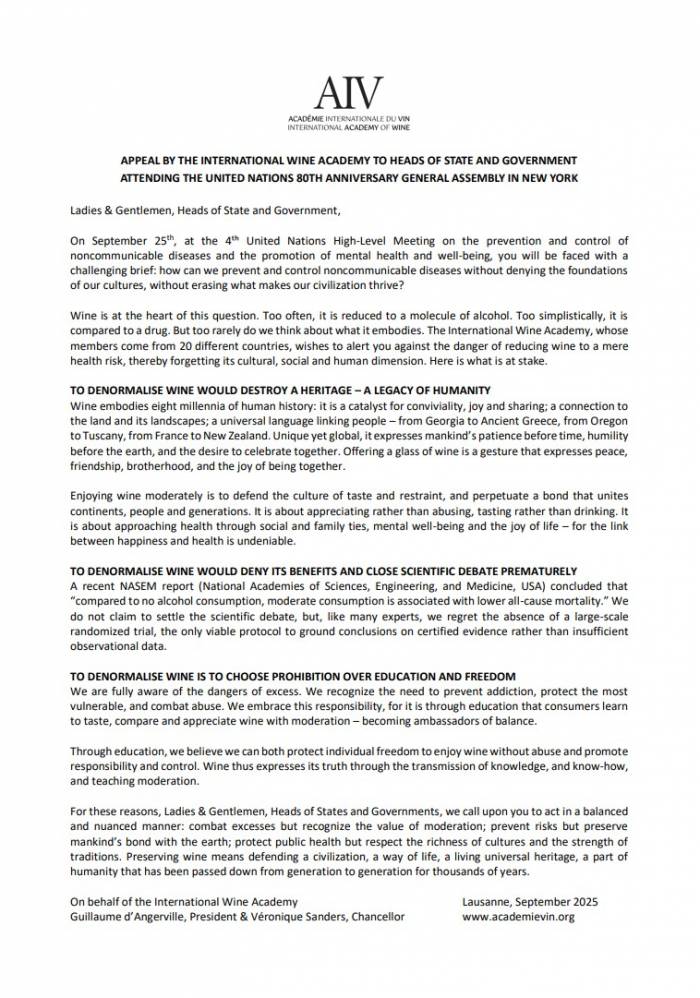Wine’s Cultural Role Defended as UN Debates Global Alcohol Policy
International Wine Academy urges leaders to balance public health with preservation of wine’s heritage and social significance
2025-09-22

As world leaders gather in New York for the 80th anniversary of the United Nations General Assembly, a new appeal from the International Wine Academy (Académie Internationale du Vin, AIV) is drawing attention to the role of wine in global culture and society. The statement, released from Lausanne and signed by AIV President Guillaume d’Angerville and Chancellor Véronique Sanders, urges heads of state and government to consider the cultural, social, and historical significance of wine as they discuss strategies for preventing noncommunicable diseases and promoting mental health.
The appeal comes ahead of the United Nations’ fourth High-Level Meeting on the prevention and control of noncommunicable diseases, scheduled for September 25. The meeting will address public health policies that could impact how alcoholic beverages, including wine, are regulated or perceived worldwide. The AIV’s message warns against reducing wine to a simple health risk or equating it with other forms of alcohol abuse. Instead, the organization highlights wine’s eight-thousand-year history as a symbol of human connection, tradition, and shared experience.
The International Wine Academy represents members from 20 countries. In its letter, the group argues that efforts to “denormalize” wine—treating it solely as a health hazard—risk erasing a vital part of humanity’s heritage. The statement points out that wine has served as a universal language across cultures, linking people from Georgia to Greece, Oregon to Tuscany, France to New Zealand. The act of sharing a glass of wine is described as an expression of peace and friendship.
The AIV also addresses scientific debates about alcohol consumption. Citing a recent report from the National Academies of Sciences, Engineering, and Medicine (NASEM) in the United States, the academy notes that moderate alcohol consumption has been associated with lower all-cause mortality compared to abstention. However, the group acknowledges that more rigorous research is needed and calls for large-scale randomized trials to provide clearer evidence.
Education is another key theme in the appeal. The academy emphasizes its awareness of the dangers associated with excessive drinking and supports efforts to prevent addiction and protect vulnerable populations. Rather than prohibition or strict regulation, the AIV advocates for education that teaches consumers how to appreciate wine responsibly. According to the statement, this approach can help preserve individual freedom while promoting moderation and public health.
The timing of this appeal is significant. As governments consider new measures to address rising rates of noncommunicable diseases such as heart disease, diabetes, and cancer—many linked to lifestyle factors including alcohol use—the debate over how to regulate products like wine has intensified. Some public health advocates have called for stricter labeling requirements or advertising bans on alcoholic beverages. Others argue that such measures could undermine cultural traditions and economic sectors tied to winemaking.
In their letter, d’Angerville and Sanders urge policymakers to find a balanced approach that protects public health without erasing centuries-old traditions. They frame wine not only as an agricultural product but as a living heritage passed down through generations—a part of civilization itself.
The International Wine Academy’s intervention adds another voice to ongoing discussions about alcohol policy at both national and international levels. As delegates meet in New York this week, their decisions may shape not only future health outcomes but also the place of wine in societies around the world.
Founded in 2007, Vinetur® is a registered trademark of VGSC S.L. with a long history in the wine industry.
VGSC, S.L. with VAT number B70255591 is a spanish company legally registered in the Commercial Register of the city of Santiago de Compostela, with registration number: Bulletin 181, Reference 356049 in Volume 13, Page 107, Section 6, Sheet 45028, Entry 2.
Email: [email protected]
Headquarters and offices located in Vilagarcia de Arousa, Spain.